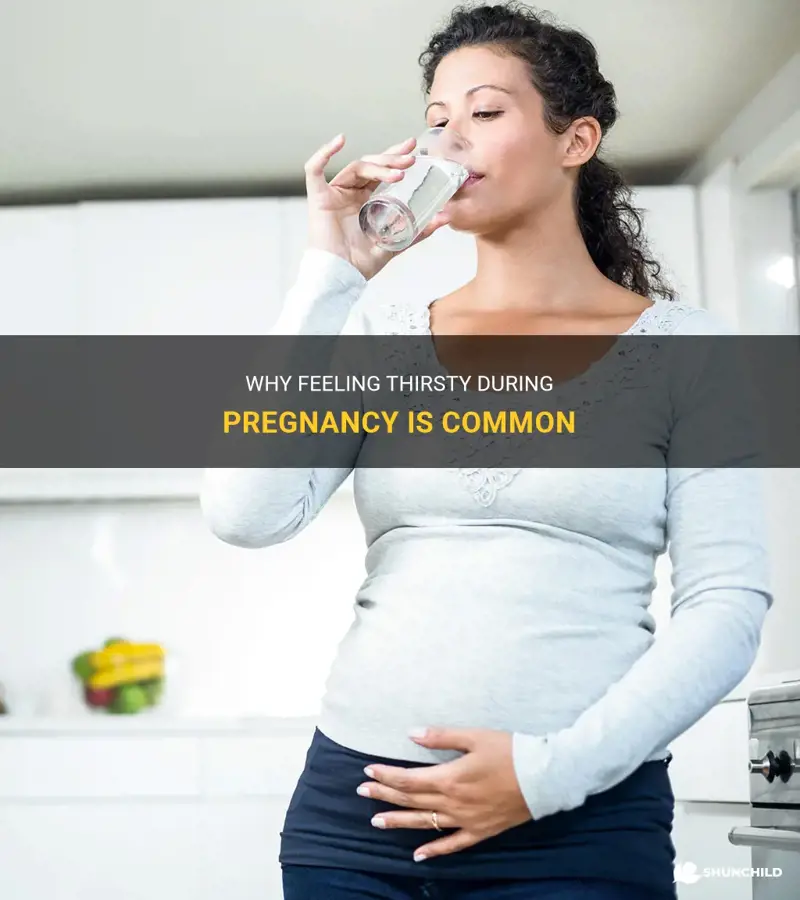
Pregnancy is a transformative journey filled with various physical and hormonal changes. Alongside the unmistakable baby bump and the many cravings that come with it, experiencing increased thirst is also common among pregnant women. It may seem strange at first, but this phenomenon is a natural response that plays a crucial role in supporting the growth and development of the baby. In this article, we will explore why being thirsty during pregnancy is a common occurrence and the importance of staying hydrated for both the mother and the baby.
| Characteristics | Values |
|---|---|
| Frequency | Common |
| Causes | Increased blood volume |
| Hormonal changes | Increased urine production |
| Gestational diabetes | Dehydration |
| Increased water intake | Hormonal changes |
| Symptoms of morning sickness | |
| Medications | Diuretics |
| Increased fluid needs | Increased blood volume |
| Third trimester | Pressure on bladder |
| Presence of other symptoms | Excessive sweating, dry mouth |
What You'll Learn
- Is it common to experience increased thirst during pregnancy?
- What causes increased thirst during pregnancy?
- How can dehydration be prevented during pregnancy?
- Are there any complications associated with excessive thirst during pregnancy?
- When should I be concerned about excessive thirst during pregnancy?

Is it common to experience increased thirst during pregnancy?
During pregnancy, women's bodies go through numerous changes to support the growth and development of the fetus. These changes can often lead to increased thirst, which is a common symptom experienced by many pregnant women.
One of the main reasons for increased thirst during pregnancy is the increased blood volume. The body needs to produce more blood to support the growing baby, and this leads to an increase in the overall fluid volume in the body. As a result, pregnant women may feel the need to drink more water to stay hydrated and maintain adequate blood volume.
Hormonal changes that occur during pregnancy can also contribute to increased thirst. Hormones such as estrogen and progesterone play a crucial role in maintaining the pregnancy and preparing the body for breastfeeding. These hormones can affect the body's fluid balance and increase the need for hydration.
Pregnant women also experience changes in the kidneys' functioning, which can affect fluid balance. The kidneys work harder during pregnancy to filter waste products from the body and maintain electrolyte balance. This increased workload can lead to greater water loss through urine and require pregnant women to drink more fluids to compensate for the increased urine output.
In addition to these physiological changes, environmental factors also play a role in increased thirst during pregnancy. Pregnant women may feel warmer than usual due to hormonal changes and an increase in blood flow to the skin. This can lead to increased sweating and a greater need for fluids to cool down the body and prevent dehydration.
It is important for pregnant women to drink enough fluids to stay properly hydrated throughout their pregnancy. Dehydration can lead to a range of complications, including preterm labor, urinary tract infections, and even poor fetal growth. The general recommendation is for pregnant women to drink at least 8-12 cups of fluids per day, but individual needs may vary.
To ensure adequate hydration, pregnant women should focus on drinking water as the primary source of fluids. Other beverages, such as milk, herbal teas, and 100% fruit juices, can also contribute to fluid intake. Avoiding excessive caffeine and sugary drinks is important, as these can have negative effects on pregnancy.
In conclusion, it is common for pregnant women to experience increased thirst due to physiological changes, hormonal fluctuations, and environmental factors. Drinking enough fluids is crucial to maintain hydration and support the body's processes during pregnancy. It is important to consult with a healthcare provider to determine individual fluid needs and ensure a healthy pregnancy.
Understanding the Importance of Pregnancy Urine Sample Testing at Each Visit
You may want to see also

What causes increased thirst during pregnancy?
During pregnancy, many women experience increased thirst, which can lead to an increased consumption of fluids. This increased thirst is a common symptom of pregnancy and can be attributed to several factors.
One of the main causes of increased thirst during pregnancy is an increase in blood volume. During pregnancy, a woman's blood volume increases significantly to support the growth and development of the fetus. This increase in blood volume can lead to dehydration, which triggers the thirst mechanism in the body.
Another reason for increased thirst during pregnancy is hormonal changes. Hormones play a crucial role in regulating fluid balance in the body. During pregnancy, hormone levels fluctuate, leading to changes in the body's fluid balance. This can result in an increased need for fluids and a feeling of thirst.
Additionally, the increased metabolic rate during pregnancy can lead to dehydration and increased thirst. The body is working harder during pregnancy to support the growing fetus, which can increase fluid loss through perspiration and evaporation. This increased fluid loss can cause dehydration and a desire for more fluids.
It is important for pregnant women to stay hydrated and drink an adequate amount of fluids to prevent dehydration. Dehydration during pregnancy can have negative effects on both the mother and the baby, including reduced blood flow to the placenta and an increased risk of preterm labor.
To ensure proper hydration during pregnancy, it is recommended that women drink at least eight to ten cups of fluids per day. Water is the best choice for hydration, but other fluids such as milk, juice, and herbal tea can also contribute to fluid intake.
In addition to increasing fluid intake, pregnant women should also be mindful of their overall nutrition. Consuming foods that are high in water content, such as fruits and vegetables, can help to supplement fluid intake and support hydration.
If a pregnant woman is experiencing excessive thirst or other symptoms of dehydration, it is important to consult with a healthcare provider. They can provide guidance on proper hydration and recommend any necessary tests or treatments to address the underlying cause of increased thirst.
In conclusion, increased thirst during pregnancy is a common symptom that can be attributed to a variety of factors, including changes in blood volume, hormonal fluctuations, and increased metabolic rate. It is important for pregnant women to stay properly hydrated to prevent dehydration and its potential negative effects. By drinking an adequate amount of fluids and consuming hydrating foods, pregnant women can ensure their hydration needs are met.
Heartburn During Pregnancy: A Common Symptom Expecting Mothers Should Know About
You may want to see also

How can dehydration be prevented during pregnancy?
Maintaining proper hydration is crucial during pregnancy to ensure the overall health and well-being of both the mother and the developing baby. Dehydration can lead to various complications, such as preterm labor, low amniotic fluid levels, and even birth defects. Therefore, it is essential for pregnant women to take proactive steps to prevent dehydration. Here are some effective strategies:
- Drink plenty of water: The simplest and most effective way to prevent dehydration during pregnancy is to drink an adequate amount of water throughout the day. The recommended daily intake is about 8-12 cups (64-96 ounces) of water. Pregnant women may need even more water to meet their increased fluid requirements. Be sure to carry a water bottle with you at all times and sip water throughout the day.
- Monitor urine color and frequency: Monitoring the color of your urine is a helpful indicator of your hydration status. Ideally, your urine should be a pale yellow color. Darker urine could indicate dehydration and may be a sign to increase your fluid intake. Additionally, paying attention to your urine frequency is also important. If you are urinating less frequently than usual, it could be a sign of dehydration and should be addressed promptly.
- Include hydrating foods in your diet: In addition to water, you can also increase your fluid intake through the consumption of hydrating foods. Fruits and vegetables with high water content, such as watermelon, cucumbers, oranges, and strawberries, can help keep you hydrated. Additionally, soups and broths can also contribute to your fluid intake while providing essential nutrients.
- Avoid excessive caffeine and sugary drinks: While it's important to stay hydrated, it's equally crucial to avoid excessive consumption of caffeine and sugary drinks during pregnancy. Caffeine has diuretic effects, which can increase urine production and potentially lead to dehydration. Similarly, sugary drinks can cause fluctuations in blood sugar levels and may not effectively quench your thirst. Opt for water, herbal tea, or diluted fruit juices instead.
- Stay cool and avoid excessive heat: Pregnant women are more susceptible to heat and may be at a higher risk of dehydration during hot weather. Therefore, it is important to remain in cool environments and limit exposure to excessive heat. Avoid spending prolonged periods in direct sunlight and opt for air-conditioned spaces whenever possible. If you have to be outdoors, wear lightweight and breathable clothing and drink plenty of water to stay hydrated.
- Consider electrolyte-enhanced drinks: In certain situations, such as prolonged periods of physical activity or excessive sweating, water alone may not be sufficient to maintain optimal hydration. In these cases, considering electrolyte-enhanced drinks can be beneficial. These drinks contain essential minerals, such as sodium and potassium, which are lost through sweat. However, it is essential to consult with your healthcare provider before consuming any electrolyte-enhanced drinks during pregnancy.
In conclusion, dehydration during pregnancy can have serious consequences for both the mother and the baby. By following these preventive measures, such as drinking an adequate amount of water, monitoring urine color and frequency, including hydrating foods in your diet, avoiding excessive caffeine and sugary drinks, staying cool, and considering electrolyte-enhanced drinks when necessary, you can ensure optimal hydration throughout your pregnancy. Remember to consult with your healthcare provider for personalized advice and recommendations based on your specific needs.
Exploring the Link Between Pregnancy Nausea and the Sex of the Baby
You may want to see also

Are there any complications associated with excessive thirst during pregnancy?
Excessive thirst during pregnancy can be a common symptom that many expectant mothers experience. While increased thirst is generally not a cause for concern, there are a few complications that can arise if it becomes excessive. In this article, we will explore the potential complications associated with excessive thirst during pregnancy and how to manage them.
Firstly, it is important to understand why pregnant women may experience increased thirst. During pregnancy, the body undergoes numerous changes to support the developing fetus. The blood volume increases, and the body produces more fluids to nourish the baby. This increased fluid production can lead to dehydration, causing the body to signal thirst.
However, if the thirst becomes excessive and is accompanied by other symptoms such as frequent urination, dry mouth, and dizziness, it may be a sign of gestational diabetes. Gestational diabetes occurs when the body cannot regulate blood sugar levels effectively during pregnancy. This can lead to increased thirst and an excessive need for fluids to flush out excess sugar from the body.
Excessive thirst can also be a symptom of preeclampsia, a serious condition characterized by high blood pressure and damage to organs such as the liver and kidneys. Preeclampsia typically occurs after the 20th week of pregnancy and can cause complications for both the mother and the baby. Along with excessive thirst, other symptoms of preeclampsia may include swelling, sudden weight gain, headaches, and changes in vision.
If you are experiencing excessive thirst during pregnancy, it is important to consult your healthcare provider. They will be able to assess your symptoms and determine the underlying cause. Blood tests and urine analysis may be performed to rule out conditions such as gestational diabetes or preeclampsia.
Management of excessive thirst during pregnancy will depend on the underlying cause. If it is determined that the thirst is due to normal pregnancy changes and increased fluid needs, drinking plenty of water throughout the day should help alleviate the symptoms. It is important to avoid sugary drinks and caffeinated beverages, as these can contribute to dehydration.
If gestational diabetes is diagnosed, your healthcare provider will work with you to develop a personalized treatment plan. This may include dietary changes, regular exercise, and monitoring blood sugar levels. In some cases, medication may be prescribed to help regulate blood sugar.
Preeclampsia requires close monitoring and medical intervention. If diagnosed, you may need to be hospitalized for further monitoring and treatment. Your healthcare provider will develop a plan to manage your symptoms and ensure the best outcome for both you and your baby.
In conclusion, while increased thirst is a common occurrence during pregnancy and typically not a cause for concern, excessive thirst can be a symptom of underlying complications such as gestational diabetes or preeclampsia. It is important to seek medical advice if you are experiencing excessive thirst, along with other concerning symptoms. Your healthcare provider will be able to determine the cause and develop a management plan to ensure a healthy pregnancy.
The Prevalence of Prom in Pregnancy: Exploring Its Frequency and Impact
You may want to see also

When should I be concerned about excessive thirst during pregnancy?
Experiencing increased thirst during pregnancy is relatively common. However, if the thirst becomes excessive or is accompanied by other symptoms, it may be a cause for concern. It is important to understand when excessive thirst during pregnancy warrants medical attention.
During pregnancy, many women experience an increase in blood volume which leads to an increased need for fluids. This can result in a feeling of increased thirst. In most cases, this increased thirst is normal and can be easily managed by drinking an adequate amount of water throughout the day.
However, if the thirst becomes excessive and is accompanied by other symptoms, it may indicate a potential health issue. One of the main concerns associated with excessive thirst during pregnancy is gestational diabetes. Gestational diabetes is a condition that affects some pregnant women, leading to high blood sugar levels. Excessive thirst can be a symptom of gestational diabetes, along with other symptoms such as frequent urination, fatigue, and blurred vision.
If you are concerned about excessive thirst during pregnancy, it is important to speak with your healthcare provider. They will be able to conduct tests to determine if gestational diabetes is present or if there are any other underlying causes for the excessive thirst. It is important not to ignore these symptoms, as untreated gestational diabetes can have negative effects on both the mother and the baby.
In addition to gestational diabetes, excessive thirst during pregnancy could also be a sign of dehydration. Dehydration can occur if you are not drinking enough fluids to meet the increased demands of pregnancy. Dehydration can be dangerous for both the mother and the baby, as it can lead to complications such as preterm labor or low amniotic fluid levels.
To prevent dehydration, it is important to drink enough water throughout the day. The Institute of Medicine recommends that pregnant women drink at least 8 to 12 cups of water per day. It is also important to avoid drinks that can dehydrate you, such as caffeinated beverages.
If you are experiencing excessive thirst during pregnancy, try to keep track of how much water you are drinking and make sure it is within the recommended range. If you are still experiencing excessive thirst despite drinking enough water, it is important to consult with your healthcare provider.
In conclusion, experiencing increased thirst during pregnancy is normal and can be managed by drinking an adequate amount of water. However, if the thirst becomes excessive or is accompanied by other symptoms such as frequent urination, fatigue, or blurred vision, it may be a cause for concern. Excessive thirst during pregnancy can be a sign of gestational diabetes or dehydration, both of which should be addressed by a healthcare provider. It is important to seek medical attention if you are concerned about your excessive thirst to ensure the health and well-being of both you and your baby.
Exploring the Safety of Decaffeinated Green Tea Consumption during Pregnancy: What You Need to Know
You may want to see also
Frequently asked questions
Yes, it is very common to experience increased thirst during pregnancy. The body undergoes numerous changes during pregnancy, including an increase in blood volume and fluid requirements. As a result, pregnant women may feel thirstier and need to drink more water to stay hydrated.
Pregnant women get thirsty more often due to several factors. One reason is the increase in blood volume, which puts additional strain on the body's fluid balance. Another factor is the increased metabolic rate during pregnancy, which leads to more water loss through sweat and urine. Additionally, the growing baby and placenta require a constant supply of fluids, contributing to increased thirst.
The general recommendation for pregnant women is to drink about 8 to 12 cups (64 to 96 ounces) of water per day. However, individual fluid needs may vary depending on factors such as activity level, weather, and overall health. It is important for pregnant women to listen to their bodies and drink when they feel thirsty. Additionally, consuming other fluids such as herbal tea and 100% fruit juice can contribute to overall hydration.
While increased thirst is generally a normal symptom of pregnancy, excessive thirst could sometimes be a sign of a underlying medical condition like gestational diabetes or dehydration. If you are experiencing extreme thirst that is not relieved by drinking fluids or are concerned about your hydration levels, it is essential to speak with your healthcare provider. They can assess your symptoms and provide appropriate guidance or examinations if needed.







